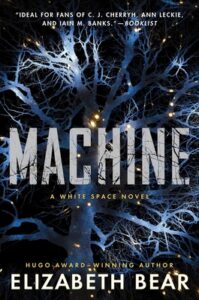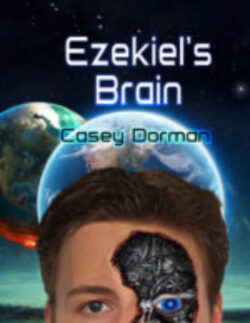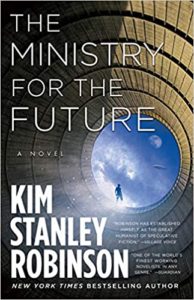A lot of people these days feel as if their world is out of control. In addressing the two biggest recent challenges to human life, the Coronavirus pandemic and global warming, neither science nor human will has coped well. In fact, global stupidity, myopic self-interest, and government ineffectiveness may be the best ways to describe humanity’s response to these challenges. Meanwhile wars continue, the threat of nuclear war has actually increased, and in America, daily murders and mass shootings seem to increase without any prospect of them coming under control. In Europe, the plight of refugees seeking new homes has sparked prejudice and hatred, and in America, even the peaceful transition of the reins of government from one political party to another has faltered. We need to take a breath and try to gain some perspective that will allow us to view the issues that threaten us in a new light. Could science fiction provide one way to do this? I think so.
At the beginning of the pandemic, I was asked to present a paper at the annual meeting of the Pacific Division of the American Philosophical Association. It could be on any topic of my choosing. I chose to discuss Philosophy and Fiction, examining the idea that teaching philosophy could be augmented by including some of the great philosophical novels in the course syllabus. I thought it would make a course more interesting and attract some students who otherwise might find the traditional teaching methods too intimidating or boring. I included 13 novels in my review, and 6 of them were science fiction (listed below), and another 3 (Kafka’s Metamorphosis, Lightman’s, The Diagnosis, and Quinn’s Ishmael) had a least a science fiction quality to them. 
I never got to present the paper, since the conference was canceled because of the Coronavirus, but in writing it, I gained the impression that science fiction has a lot to offer when thinking about the human condition, and even beyond humans, about the nature of reality and the universe we live in.
Recently, I began reading an author who is new to me, although she’s been writing for many years. Her name is Elizabeth Bear and I’m now reading my second of her novels in her White Space series. As with many sci-fi authors, Bear’s novels, or at least the ones I’m reading, take place in the distant future. It is a future in which space ships travel at warp speed, their functions controlled by AI shipminds, where multiple alien races abound, most of them living in harmony with each other, except for a few obligatory space pirates, and where characters’ bodies are modified to fit space flight and their body chemistry adjusted to reduce pain and anxiety, and where everyone’s mind has been altered—rightminded—so that the normal human urges and conceptions that undermined relationships and created disastrous consequences for the race in the past, are muted or replaced. In short, everything that could be done to make humans less cantankerous, more cooperative, more trustworthy and less likely to destroy themselves and each other has been done, presumably through some kind of brain tinkering and training. At least some of her characters call it brainwashing, but others feel as if humans could never live peacefully with other races without this kind of adjustment. I’m only beginning to see how Bear addresses the pros and the obvious cons of this situation. The idea, however, is a striking one, which most people, having been brought up on the value of uncoerced, individualistic thinking, would not think twice about rejecting, but when you look at how we’re doing in getting along with each other and cooperatively solving our problems, maybe it deserves looking into. Elizabeth Bear’s science fiction lets us do that.
My academic and professional background is in science and the hallmark of science is evidence. Science fiction is mostly free from the need for evidence. It is fiction, speculative fiction. It allows the writer to speculate and present ideas, concepts, technology, and even scientific advances without having to provide evidence that any of it would ever work. In doing so, the writer can present alternatives to the way we think about our world, including ourselves, which provides the reader with an insight into how the author thinks about those things, but also provokes the reader to think about them themself. With Bear’s concept of rightminding, one can wonder whether being able to quiet the dishonest, greedy, hierarchical, competitive, violent urges and mindset that characterize most members of the human race at one time or another would be good, perhaps even necessary, to ensure the race’s survival, or would simply lead to a 1984, in which the control of people’s thinking results in belief in a fictional reality created by the government and in mindless conformity by the people. The science fiction author can explore both sides of the issue by producing a made-up world in which the consequences of future decisions are portrayed in dramatic fashion.
 What if we developed superintelligent, autonomous artificial intelligences? That’s a question that we’ll probably have to face sooner than we face warp-speed space travel or need to figure out whether we can cooperate with alien species. Some people think the possibility is right around the corner. My novel, Ezekiel’s Brain, and others such as Calum Chace’s Pandora’s Brain, or Daniel Wilson’s Robopocalypse address the issue, each with different outcomes. Ezekiel’s Brain is part of a series, in which the AIs outlive the humans and become the principal characters in a quest to explore the universe and alien civilizations. In writing it, I try to contrast the way humans think and behave with the way machines, pursuing similar goals, would think and behave. The presence of Ezekiel, which is a human mind inside a machine, allows that contrast, as do the instances when alien races, some human and some not, from other planets are encountered. The sci-fi writer and philosopher, Stanislaw Lem, wrote several novels in which humans met alien intelligences, whose mode of thinking was so foreign to the human mind that it was incomprehensible. In doing so, he was able to show how our own minds shape the reality we perceive.
What if we developed superintelligent, autonomous artificial intelligences? That’s a question that we’ll probably have to face sooner than we face warp-speed space travel or need to figure out whether we can cooperate with alien species. Some people think the possibility is right around the corner. My novel, Ezekiel’s Brain, and others such as Calum Chace’s Pandora’s Brain, or Daniel Wilson’s Robopocalypse address the issue, each with different outcomes. Ezekiel’s Brain is part of a series, in which the AIs outlive the humans and become the principal characters in a quest to explore the universe and alien civilizations. In writing it, I try to contrast the way humans think and behave with the way machines, pursuing similar goals, would think and behave. The presence of Ezekiel, which is a human mind inside a machine, allows that contrast, as do the instances when alien races, some human and some not, from other planets are encountered. The sci-fi writer and philosopher, Stanislaw Lem, wrote several novels in which humans met alien intelligences, whose mode of thinking was so foreign to the human mind that it was incomprehensible. In doing so, he was able to show how our own minds shape the reality we perceive.
Climate change is, perhaps, the human race’s greatest threat (although the war in Ukraine has brought back the threat of nuclear annihilation). Scientists and politicians are grappling with how to combat global warming, and so far, their success has been limited, verging on nonexistent. Some of our best speculative thinkers, Stephen Hawking, Elon Musk, Michio Kaku, have recommended moving all or part of earth’s population to another planet. This is a well-known science fiction trope, with some writers, such as Greg Bear and Kim Stanley Robinson, producing absolutely absorbing stories about what might happen in such a scenario. Robinson is perhaps the one who has taken the idea most seriously. His Mars Trilogy has earthlings terraforming the red planet, and his novel, Aurora features a giant starship that travels for centuries only to find that their destination is a planet that is lethal to humans, and they are forced to turn back. Robinson seems to have decided that leaving earth won’t work and fixing global warming is the solution. His 2020 novel The Ministry of the Future, provides a detailed scenario of deadly global warming and offers multiple solutions to avoid such an outcome. Bill Gates listed the book on his summer reading list.
Whether the issue is dealing with humans’ deadly instincts, independence of thinking vs. mind-control, the limits of the human mind, the threats and promise of artificial intelligence, the pros and cons of leaving earth, or how to deal with our most pressing issues, such as climate change, science fiction provides a platform for thinking about such things in a speculative way, not fettered by being tied to what we now know, and available to those who are not expert in these fields, but have inquiring minds. In my experience, it is not frivolous, wasted thought, even though reading science fiction is something I do primarily for fun. It provides a perspective that allows a reader to think beyond what he knows for sure, to think about a bigger picture and the implications of new developments, and to have a wider view on what’s possible and what the future may hold. Given that our society seems stymied by its problems at the moment, it can’t hurt to loosen the blinders of current events and look beyond them to the “what if” world that we might create if we choose to. Science fiction offers an opportunity to do that.
Short list of (6) classic philosophical science fiction books:
Dick. P. K. Do Androids Dream of Electric Sheep? (1968). New York: Del Rey Books.
Egan, S. (2013). Permutation City [Kindle version]. Retrieved from amazon.com
Huxley, A. (1998). Brave New World. New York: Perennial Classics. (Original work published 1932)
Lem. S. (1961). Solaris [Kindle version]. Retrieved from amazon.com
Lem. S. (1964). The Invincible [Kindle version]. Retrieved from amazon.com
Orwell, G. (2019) 1984. New Delhi: Delhi Open Books. (Originally published 1949)
Other science fiction novels mentioned:
Bear, E. (2019). Ancestral Night. New York: Saga Press.
Bear, E (2020). Machine. New York: Saga Press.
Bear, G. (2017). The Eon Series: Legacy, Eon, Eternity. (Kindle Edition) Open Road Media Sci-Fi & Fantasy.
Chace, C. (2014). Pandora’s Brain. London: Three C’s.
Kafka, F. (2003). The Metamorphosis, In the Penal Colony, and Other Stories. New York: Touchstone. (Originally published 1915)
Lightman, A. (2002). The Diagnosis. New York: Vintage Reprint Edition
Quinn. D. (1995). Ishmael. New York: Bantam.
Robinson, Kim Stanley (2015). Aurora. London: Orbit.
Robinson, Kim Stanley (1996). Mars Trilogy: Red Mars, Blue Mars, Green Mars. New York: Bantam Spectra
Robinson, Kim Stanley (2020). The Ministry of the Future. London: Orbit.
Wilson, D.H. (2012). Robopocalypse. New York: Vintage.
Buy Ezekiel’s Brain on Amazon. Click HERE
Subscribe to Casey Dorman’s Newsletter. Click HERE






Can’t, I also believe that a lifelong habit of consuming the myriad ideas and concepts of authors of speculative fiction leads to a wider view of the human condition and the universe we live in writ large. Often times, to bring progress into reality it is necessary to be able to imagine it first. Though I would have a different list of books through personal preference, these books by their very nature add perspective to what we perceive as reality.
In my current book I have tried to imagine what the outcome of the discovery of portal gates between worlds by humans looking to escape their birth planet. Bear offers the idea of changing our species by eliminating the traits that allowed us to survive the brutal climb up the food chain. My premise is with no constraints and an open pathway to a galaxy of habitable worlds, humans would advance bringing all of their bad habits with them. The other side of that coin. 😮
Appreciate the comment, Larry. The fact that Bear envisions such a thing as “rightminding,” which I may not have fully or accurately captured, since she so far hasn’t explained the process, gives us something to think and talk about. In the Ezekiel series, the AIs are built to behave according to “humanity’s highest values,” which includes no war or killing. Most of those values get tested in each novel: are they workable? necessary? truly ethical? I’d love to talk about these issues someday.
Social Revolution (formerly Social Fiction…):
Everyone has passed a community competency review – has a vote (voting is a social requirement, below)
Social violations are established universally, and penalties are reformation-based benefit reductions. When possible, “do-overs” are allowed.
Anti-social behaviors are treated immediately.
All useful products and services are defined (transport, foods, rules enforcement, drug use, activities, education, etc.) – determined by universal vote.
All community agencies and services are determined/managed by universal annual approval vote based on mission and annual budget indexed to *taxes or *Investments.
Employment (and parenting) are qualified and approved by member vote.
Only employees/retirees should own the stock in their work.
*Taxes and *Investments are fixed-rate, renewable loans.
All members are self-insured, with health plans.
Management compensation on a sliding scale by multiples related to average employee’s wage, subject to annual reviews/rating by stockholders.
All income above operating costs are be paid out in annual bonuses/stock splits or stockholder approved expansions/mergers.
…This exists in one of our parallel universes – soon to be revealed by the James Webb Telescope.
I’ll be scanning the James Webb downloads to see if we find this place. Elizabeth Bear’s Synarche society has a fair resemblance to what you describe. I would probably go even further to provide free and universal health care and to make income more on parity across the population. I like the direct democracy aspect of it.